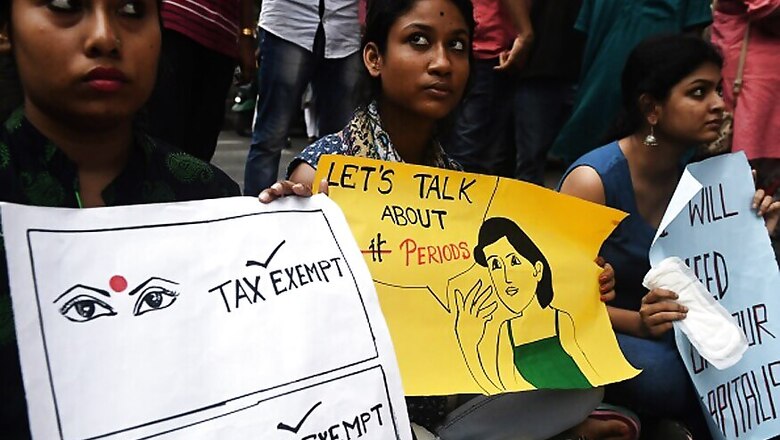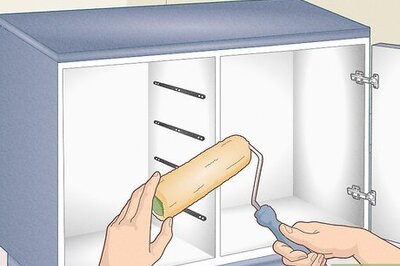
views
We all agree that equality is a right and not just an idea in our country. However, the complexities of our society don’t always allow it to play out in our day to day lives. We all have a role to play: the government as well as you and I.
Legislations and policies are instrumental in removing obstacles. We may not realise the extent to which fiscal policies of a government can have an impact on social injustices. To function as a welfare state, makers of fiscal policies must not have a myopic view.
I remember my visit to the World Bank two years ago, where we discussed the important role that taxation has had on curbing the sale of tobacco products, a serious health hazard that all nations are struggling with.
We don’t ban but we tax heavily; the rationale of taxing sin goods at a higher rate works and is rarely questioned. Therefore goods and things essential to the existence of our people are exempt.
This brings me to the pertinent debate on whether sanitary napkins should have been inserted in a low tax bracket or ideally left untaxed. The government clearly is not revisiting this issue despite several meetings of the GST Council.
It is clearly a product that is essential to 50% of our population, which they need for the better part of their lives. When I started the campaign ‘tax free wings’, I cannot deny that I was heard by three key ministers — Woman & Child Development, Health and the Finance Minister himself. But what became clear is that they were not listening.
The proposal was met with a hyper technical argument based on a purely industry centric logic by the Ministry of Finance. The government rejected the proposal to reduce tax on sanitary napkins as it would apparently hamper smaller manufacturers, and larger manufacturers would stand to gain. A complex argument about input tax credit was also put forth.
To accept such a proposal requires two things — a less myopic view removed from a purely financial perspective. Such a view should not ignore the fact that an overwhelming number of women don’t have access to hygienic methods of dealing with menstruation and the affordability of sanitary pads is a primary reason.
Use of sawdust, paper and cloth is not uncommon and has led to loss of lives. Secondly, a real conviction to women empowerment is to use a fiscal policy as an enabler to ensure women’s right to equal opportunity to educate themselves, to join the workforce and release themselves from the stigma connected to menstruation. It’s simple — if you are equipped to handle it better, you overcome the stigma.
I appreciate the efforts by various state governments to give free sanitary pads in schools and sell subsidised pads through NRHM workers, but quality and last mile delivery still remain a challenge. There are many more girls who don’t make it to schools for one reason or another, and so will not avail the free distribution of sanitary pads in schools. They need the last mile delivery.
Distribution by Asha workers in some states cannot be compared to the local reach any private company would have if the product was priced to ensure it is affordable by the rural and remote informal markets.
I have written and spoken repeatedly on this issue and it has not worked till now. The reasons to my kind are simple — every time woman empowerment becomes a matter for any government’s propaganda, it is not going to work. Nothing short of Ms. World’s intervention worked for the Haryana government to address this issue. I thanked Ms. Chillar on Twitter because she succeeded in convincing the Haryana government on this very important issue which numerous activists, NGOs, and parliamentarians across party lines, who joined me in my campaign, could not achieve with the central government.
As a woman parliamentarian, I see repeated tokenism in the name of empowering women. To give one example to bolster my opinion is the maternity benefit Act that gives paid leave to lactating women without any financial support or contribution from the government to the employer.
In a country where the number of women in the formal workforce remains dismal, this may well work to the detriment of women by making them economically less viable to an employer than a man. Moreover, majority of the workforce in the unorganised sector comprises women and they are left out of this scheme.
Laws imposed in the name of empowerment of women must have the desired results rather than militate against the status of women.
Secondly, I was disappointed but not surprised to see the Prime Minister’s campaign where he claims to have given 2 crore women dignity by giving a gas cylinder free of charge. I support any measure for clean energy but dignity of women cannot be connected to a kitchen equipment or a cooking facility. It is regressive and reeks of chauvinism. I cannot deny that clean energy gives an entire family a better quality of air to breathe, but it’s a gender-neutral issue; it is not just a woman’s issue.
Gender justice remains a complex issue for any nation. It is, therefore, also the most talked about. But when it comes to the real test, our right to life become less important than an industry’s and our right to equal opportunity becomes subservient to the interests of the treasury.
While our government consistently brags about reforms and hammers at financial reform, social reforms take a back seat. The question they need to ask themselves is whether accepting to make napkins free will help save more women to survive with dignity than a cylinder of cooking gas and empower many by fighting the stigma attached to menstruation.
Doesn’t matter that a petition pending in the High Court of Delhi rightly asserts the right to tax free sanitary napkins as a right to life issue, the release of Padman, a film that will hopefully reflect with accuracy, the conviction of a man to address the issue of menstrual hygiene may well strike the imagination of a prime minister known for his affinity to the limelight.
I have received an invitation from Maneka Gandhiji to watch the premier of the film, which although I cannot attend, I am watching!
(The author is president of the All India Mahila Congress and MP from Silchar. Views are personal.)




















Comments
0 comment